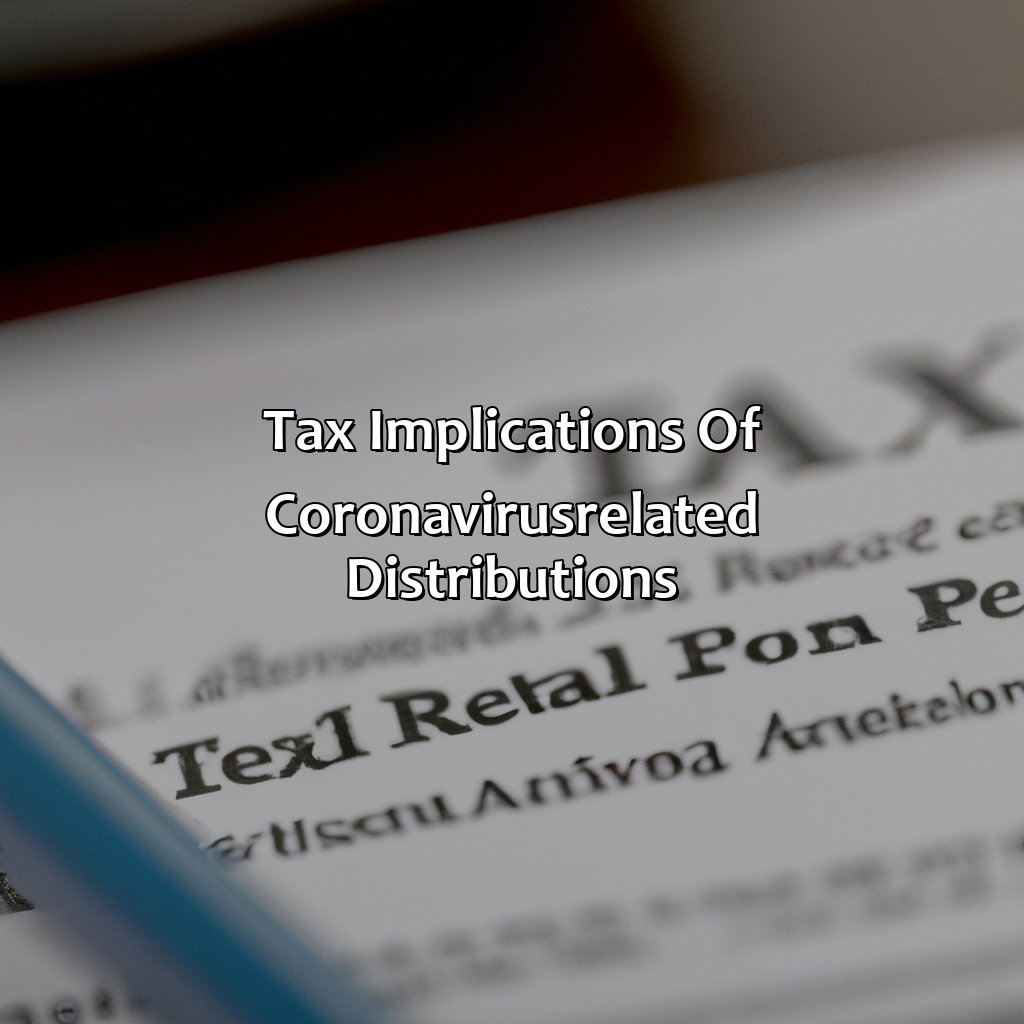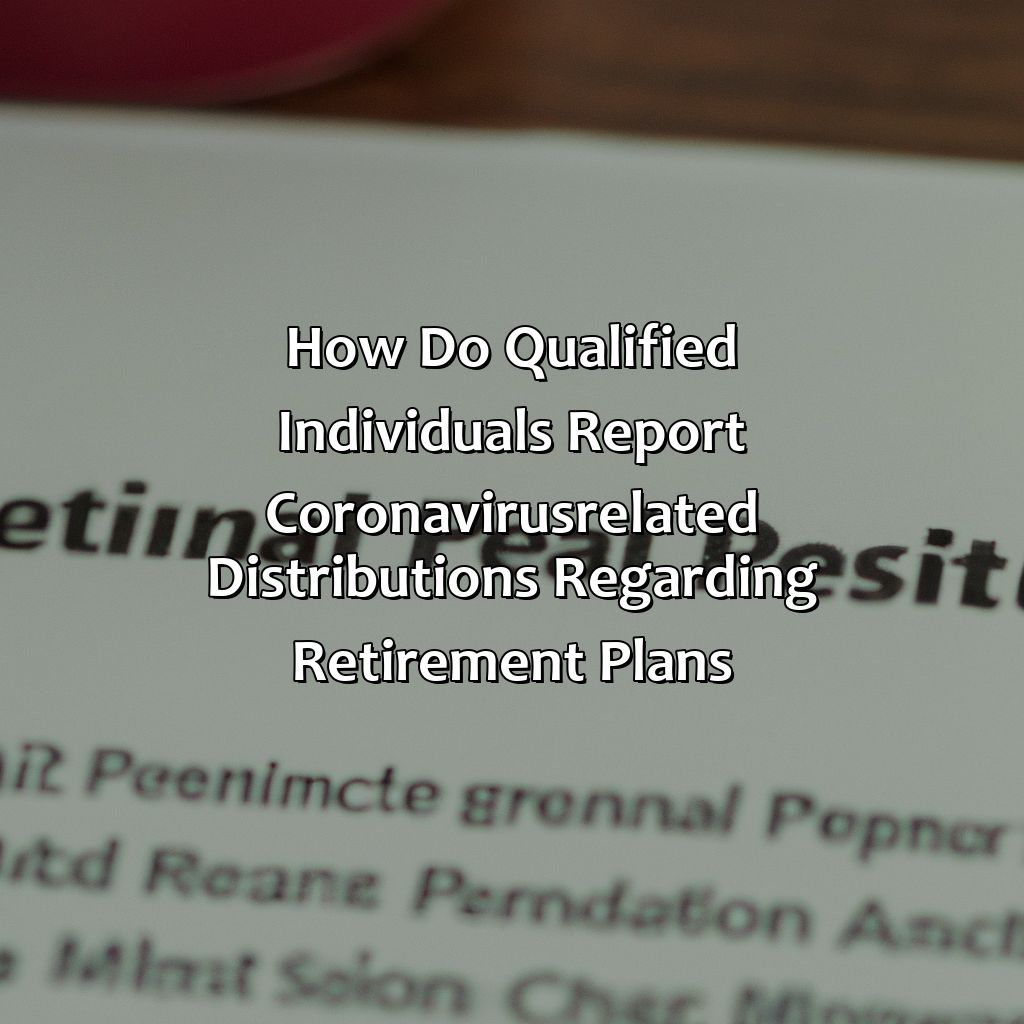How Do Qualified Individuals Report Coronavirus-Related Distributions Regarding Retirement Plans?
Key Takeaways:
- Qualified individuals are eligible to take coronavirus-related distributions from their retirement plans without incurring early withdrawal penalties.
- Qualified individuals are required to report these distributions on their tax returns, even if they choose to repay the distributions within three years.
- Non-compliance with reporting requirements may result in potential penalties such as additional tax liabilities and interest charges.
Are you worried about how to report your coronavirus-related distributions from your retirement funds? Here’s all you need to know to understand the reporting requirements.
Reporting Requirements for Coronavirus-Related Distributions
Awareness of eligibility criteria and the reporting process is a must to report coronavirus-related distributions regarding retirement plans. Qualified individuals must meet certain criteria, such as a diagnosis of COVID-19, taking care of someone with COVID-19, and other financial hardships. Additionally, the reporting process requires various forms and codes to be filled out by individuals.
Eligibility Criteria for Qualified Individuals
Qualified Individuals for Coronavirus-Related Distributions
Individuals who were affected by COVID-19 or directly impacted due to the pandemic are qualified individuals for coronavirus-related distributions (CRDs) regarding retirement plans. These individuals may be diagnosed with COVID-19, had a spouse or dependent diagnosed with COVID-19, experienced a furlough, layoff, or reduction in work hours, or had to stay home due to lack of childcare.
Qualified individuals can withdraw up to $100,000 from their eligible retirement plans without any 10% early distribution penalty under the CARES Act. The CRDs are exempted from 20% tax withholding requirements and can either be repaid within three years or taxed over three years.
It is essential to note that only eligible retirement plans that accept distributive contributions qualify for CRDs. These include 401(k), 403(b), and most individual retirement accounts (IRAs).
In March 2020, Congress passed the CARES Act enabling qualified individuals easier access to their own retirement savings during difficult times like these. This act aims at supporting people economically and financially affected by the ongoing pandemic.
Please report your coronavirus-related retirement plan distributions quickly, because frankly, we’re all just trying to keep track of our expenses during the apocalypse.
Reporting Process for Individuals
When it comes to reporting coronavirus-related distributions from retirement plans, qualified individuals have certain requirements to follow. These reporting procedures ensure that all necessary information is disclosed and proper documentation is maintained. Qualified individuals must report these distributions on their tax returns using Form 8915-E, which details the distribution amount, any applicable taxes withheld, and other relevant figures. Additionally, they must maintain all supporting documents in case of an audit or other compliance inquiry. By following these reporting requirements, qualified individuals can remain in compliance with IRS regulations and avoid any potential penalties.
Unique to this process is the ability for qualifying individuals to repay these distributions without penalty if they do so within three years of receiving them. This repayment option provides a safety net for those who may have taken the distribution prematurely out of financial hardship but later found themselves without as many restrictions.
One prominent example of this in action occurred during the COVID-19 pandemic when Congress passed the CARES Act in March 2020. The act allowed eligible individuals who were affected by the pandemic to access certain retirement funds early without penalty and provided leniency in repayment options. Many Americans utilized this provision during such a financially challenging time.
The only thing scarier than catching COVID-19 is the tax implications of coronavirus-related distributions from your retirement plan.
Tax Implications of Coronavirus-Related Distributions
Gain insight into the tax effects of coronavirus-linked distributions for retirement accounts. Look into the part entitled “Tax Implications of Coronavirus-Related Distributions”. Its two subsections are “Tax Treatments for Qualified Individuals” and “Potential Penalties for Non-Compliance with Reporting Requirements.” These subsections will give you all the info to stay penalty-free while still obeying the relevant tax rules.

Image credits: retiregenz.com by James Woodhock
Tax Treatments for Qualified Individuals
Individuals who qualify for coronavirus-related distributions from their retirement plans need to be aware of the tax implications. Tax treatments for eligible individuals depend on several factors, such as whether they choose to spread out the distribution over three years or take the full amount in one year. Additionally, qualified individuals must report these distributions on their tax returns and should consider discussing any potential tax obligations with a financial advisor or tax professional.
It is important to note that certain criteria must be met to qualify for coronavirus-related distributions, including a COVID-19 diagnosis, caring for a spouse or dependent with COVID-19, or experiencing financial hardship due to the pandemic. Those who meet these requirements may withdraw up to $100,000 from their retirement plan without penalty.
One example is Jane, who was diagnosed with COVID-19 and was unable to work during her recovery period. She withdrew $50,000 from her 401(k) as a coronavirus-related distribution and chose to spread out the taxes owed over three years. By doing so, she was able to minimize the immediate impact on her finances and better manage her tax burden.
Potential Penalties for Non-compliance with Reporting Requirements
Individuals who fail to comply with the reporting requirements regarding coronavirus-related distributions may face penalties. Failure to report accurate information or including false data in tax returns could lead to substantial fines, ranging from $1,000 to $10,000 per violation. Additionally, not following the guidelines for taking qualified distributions or using the money for inappropriate purposes may also result in penalties.
It is important to note that these penalties are not exclusive and can be imposed alongside other applicable rules and regulations. Therefore, individuals must ensure they meet all the necessary requirements and remain up-to-date with any changes made to tax laws and regulations. This will help them avoid costly mistakes that could negatively impact their future financial position.
Moreover, non-compliance can also open the door for further scrutiny by federal agencies like the IRS. This can result in additional investigations that could unearth other unrelated issues- leading to even higher fines or legal repercussions. In some cases, this may also affect one’s credit score and reputation.
A true story of a man who withdrew funds from his 401(k) under Coronavirus-related distribution but failed to report it accurately on his tax returns was fined around $5,000 in taxes and penalties. This serves as a cautionary tale of how not complying with reporting requirements can have serious consequences for individuals looking for fiscal relief pertaining to their retirement plans amidst Covid-19.
Some Facts About How Qualified Individuals Report Coronavirus-Related Distributions Regarding Retirement Plans:
- ✅ Qualified individuals are allowed to take coronavirus-related distributions from their retirement plans without penalty. (Source: IRS)
- ✅ Such distributions may be repaid within three years to avoid taxation. (Source: Forbes)
- ✅ Coronavirus-related distributions are limited to $100,000 per individual. (Source: Investopedia)
- ✅ Qualified individuals include those who have been diagnosed with COVID-19, have a spouse or dependent who has been diagnosed, or have experienced financial hardship due to the pandemic. (Source: AARP)
- ✅ Reporting coronavirus-related distributions on tax returns requires using Form 8915-E. (Source: TurboTax)
FAQs about How Do Qualified Individuals Report Coronavirus-Related Distributions Regarding Retirement Plans?
How do qualified individuals report coronavirus-related distributions regarding retirement plans?
Under the CARES Act, individuals who were impacted by the COVID-19 pandemic could withdraw up to $100,000 from their retirement plans without paying the usual 10% early withdrawal penalty. These withdrawals are called coronavirus-related distributions (CRDs). Here’s how qualified individuals can report CRDs regarding their retirement plans:
Do I need to report my CRDs as taxable income?
Yes, CRDs are typically subject to federal income tax. However, the CARES Act allows you to spread the tax liability over three years. If you pay back the distributions within three years, you won’t owe any taxes on that money.
What tax form do I need to report my CRDs?
You will need to file Form 8915-E, which is a new form created specifically for CRDs. This form allows you to report the amount of your CRDs, any taxes withheld, and how you plan to spread the tax liability over the next three years.
Is there a deadline for reporting my CRDs?
Yes, you must report your CRDs on your tax return for the year in which you received the distributions. For example, if you received a CRD in 2020, you must report it on your 2020 tax return, which is due on April 15, 2021.
What if I made a mistake when reporting my CRDs?
If you made an error when reporting your CRDs, you may need to file an amended tax return using Form 1040-X. This form allows you to correct any mistakes on your original tax return, including the reporting of CRDs.
Should I consult a tax professional for help with reporting my CRDs?
Yes, if you’re unsure about how to report your CRDs or if you have other complicated tax issues, it’s always a good idea to consult a tax professional. They can help ensure that you’re reporting your CRDs correctly and taking advantage of any tax benefits available to you.




